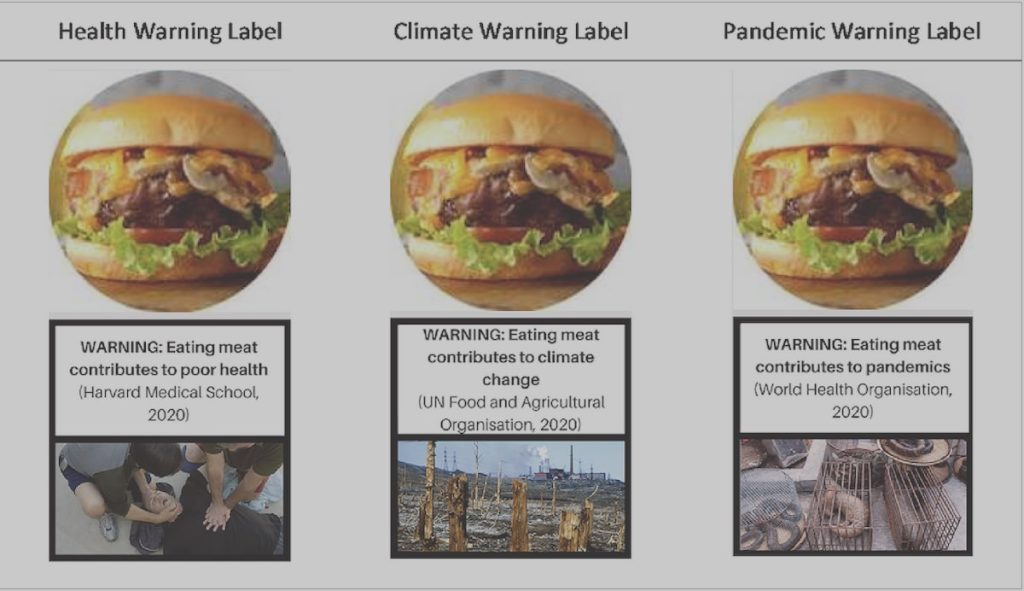Cigarette-Style Warning Labels Could Persuade Consumers Away From Meat, Study Finds
4 min read
Three different labels used in the study, each warning that eating a meat-based burger contributes to one of the following: poor health, climate change, pandemics. Jack P. Hughes, Mario Weick, Milica Vasiljevic / Elsevier / CC BY 4.0
Founded in 2005 as an Ohio-based environmental newspaper, EcoWatch is a digital platform dedicated to publishing quality, science-based content on environmental issues, causes, and solutions.
Graphic warning labels on cigarettes that show the health risks of smoking are enough to help some people quit, so would the same tactic work for meat consumption?
A new study from the Department of Psychology at Durham University found that cigarette-style warning labels could help reduce people’s consumption of meat.
Researchers demonstrated that using pictorial warnings on meat options has the potential to reduce the carbon footprint in the UK and improve public health, a press release from Durham University said.
“Meat consumption is deeply ingrained in Western societies. The United Kingdom is a good example, where according to a recent YouGov poll, 72% of the UK population classify themselves as meat eaters whereas only 7% of Britons classify themselves as either vegetarian or vegan. At the same time, meat consumption has been linked to poorer health outcomes, worsening climate change, and more recently as a contributor to pandemic infections,” the authors of the study wrote.
The study, “Impact of pictorial warning labels on meat meal selection: A randomised experimental study with UK meat consumers,” was published in the journal Appetite.
In the study, researchers tested three different warning labels that showed the effects of meat on either health, climate or pandemic risk, the press release said. They found that all three effectively discouraged people from selecting meals containing meat.
Each warning label had a graphic image with text and reduced meat meal choices from seven to 10 percent. People favored the labels with climate warnings, which they found to be the most credible.
The Climate Change Committee (CCC), an independent entity that advises the UK government, has made a recommendation to reduce consumption of meat and dairy by 20 percent by the end of the decade.
“When you combine that [CCC advice] with the fact that high meat intake is linked to lots of health issues, and the way that we currently farm, or certainly some of the most common ways of farming, are also very heavily linked to the potential of pandemic outbreaks, it becomes clear that there are multiple reasons why the current way that we eat meat is maybe not the best way to do it,” said Jack Hughes, a Ph.D. candidate and leader of the study, as reported by The Guardian.
The research team split a sample of 1,001 adult consumers of meat into four groups, the press release said. Each group was shown images of hot meals which contained either a climate warning label, a pandemic warning label, a health warning label or no label at all. The participants were then asked to make 20 individual decisions regarding different meal choices. The researchers also asked how believable and anxiety-provoking they found the labels.
The most effective label for discouraging the participants from eating particular meat choices were pandemic warnings, which reduced their choosing them by 10 percent, The Guardian reported. The next most effective were health warnings at 8.8 percent, followed by climate warnings at 7.4 percent. The researchers said the results were not statistically significant, but that the participants had found the climate warning labels to be the most convincing.
The study also measured participants’ opinions on how appealing the meals were, as well as future plans to purchase and eat particular meal options.
The researchers said the findings could end up helping people make more environmentally friendly meal choices.
“Reaching net zero is a priority for the nation and the planet,” Hughes said, according to The Guardian. “As warning labels have already been shown to reduce smoking as well as drinking of sugary drinks and alcohol, using a warning label on meat-containing products could help us achieve this if introduced as national policy.”
Subscribe to get exclusive updates in our daily newsletter!
By signing up, you agree to the Terms of Use and Privacy Policy & to receive electronic communications from EcoWatch Media Group, which may include marketing promotions, advertisements and sponsored content.





